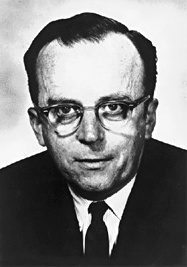1.
In a few years, men will be able to communicate more effectively through a machine than face to face. That is a rather startling thing to say, but it is our conclusion.
J. C. R. Licklider
2.
We need to substitute for the book a device that will make it easy to transmit information without transporting material.
J. C. R. Licklider
3.
The hope is that, in not too many years, human brains and computing machines will be coupled together very tightly, and that the resulting partnership will think as no human brain has ever thought and process data in a way not approached by the information-handling machines we know today.
J. C. R. Licklider
4.
Men are noisy, narrow-band devices, but their nervous systems have very many parallel and simultaneously active channels. Relative to men, computing machines are very fast and very accurate, but they are constrained to perform only one or a few elementary operations at a time. Men are flexible, capable of "programming themselves contingently" on the basis of newly received information. Computing machines are single-minded, constrained by their "pre-programming."
J. C. R. Licklider
5.
A multidisciplinary study group ... estimated that it would be 1980 before developments in artificial intelligence make it possible for machines alone to do much thinking or problem solving of military significance. That would leave, say, five years to develop man-computer symbiosis and 15 years to use it. The 15 may be 10 or 500, but those years should be intellectually the most creative and exciting in the history of mankind.
J. C. R. Licklider
6.
It seems reasonable to envision, for a time 10 or 15 years hence, a "thinking center" that will incorporate the functions of present-day libraries together with anticipated advances in information storage and retrieval and ... a network of such centers, connected to one another by wide-band communication lines and to individual users by leased-wire services.
J. C. R. Licklider
7.
About 85 per cent of my "thinking" time was spent getting into a position to think, to make a decision, to learn something I needed to know. Much more time went into finding or obtaining information than into digesting it. Hours went into the plotting of graphs... When the graphs were finished, the relations were obvious at once, but the plotting had to be done in order to make them so.
J. C. R. Licklider
8.
One must be prepared to reject not only the schema of the physical library, which is essentially a response to books and their proliferation, but the schema of the book itself, and even that of the printed page as a long term storage device, if one is to discover the kinds of procognitive systems needed in the future.
J. C. R. Licklider
9.
It should be possible, in a 'debreviation' mode, to type 'clr' on the keyboard and have 'The Council on Library Resources, Inc.' appear on the display.
J. C. R. Licklider
10.
My "thinking" time was devoted mainly to activities that were essentially clerical or mechanical: searching, calculating, plotting, transforming, determining the logical or dynamic consequences of a set of assumptions or hypotheses, preparing the way for a decision or an insight.
J. C. R. Licklider

